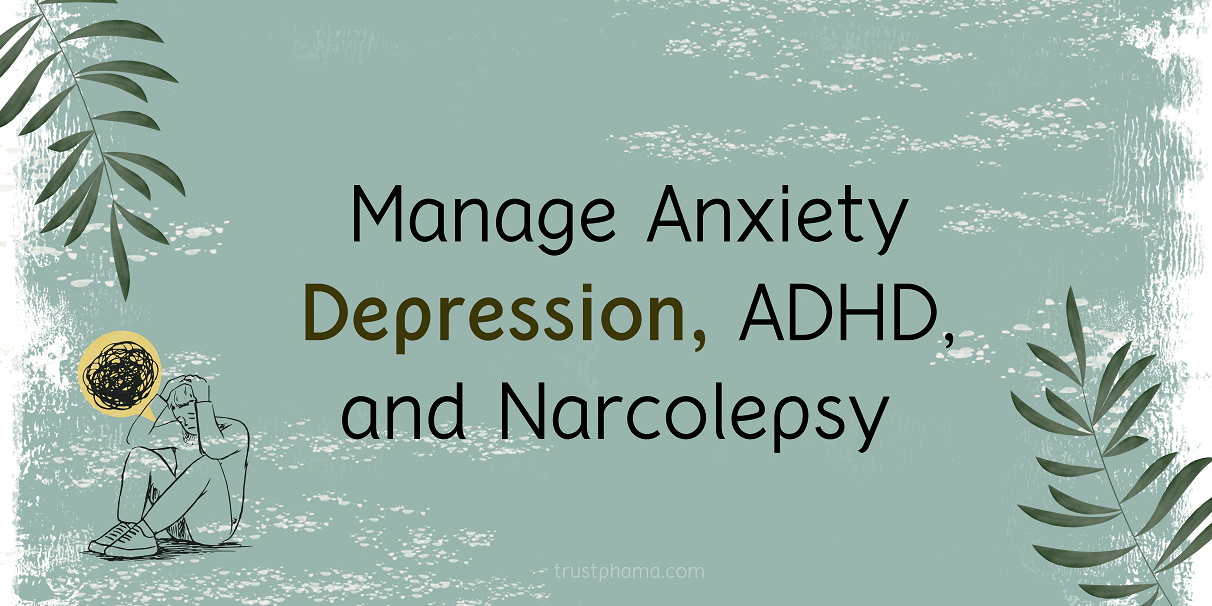Adderall is a prescription stimulant medication commonly used to treat attention deficit hyperactivity disorder (ADHD) and narcolepsy. While some information online may suggest it can be used for depression, anxiety, or weight loss, it’s important to understand Adderall’s limitations and potential risks.
How Does Adderall Work for Depression, Anxiety, Weight Loss, and Narcolepsy?
Adderall is a combination of amphetamine and dextroamphetamine, which are stimulants of the central nervous system. It works by increasing neurotransmitters like dopamine and norepinephrine levels in the brain, helping improve focus, attention, and impulse control.
Adderall for Depression
How It Works
For some individuals, especially those with treatment-resistant depression, Adderall may help alleviate symptoms. The increase in dopamine and norepinephrine can enhance mood, energy levels, and motivation, temporarily relieving depressive symptoms.
Considerations
- Effectiveness: Adderall is not a first-line treatment for depression and is usually considered when traditional antidepressants are ineffective.
- Risks: Long-term use can lead to dependency, tolerance, and potential side effects such as insomnia, increased heart rate, and anxiety.
Adderall for Anxiety
How It Works
Adderall is not typically prescribed for anxiety. Stimulants like Adderall can sometimes exacerbate anxiety symptoms by increasing arousal and stress levels.
Considerations
- Caution: For those with anxiety disorders, Adderall may increase feelings of nervousness and agitation.
- Alternative Treatments: Anxiety is better managed with medications like SSRIs, SNRIs, or benzodiazepines, along with therapy.
Adderall for Weight Loss
How It Works
Adderall can put an end to appetite and increase metabolism, helping with weight loss. This effect is a byproduct of its stimulant properties, which can decrease feelings of hunger and increase energy expenditure.
Considerations
- Not Recommended: Using Adderall for weight loss is not recommended due to the risk of dependency, cardiovascular issues, and potential abuse.
- Health Risks: Long-term use for weight management can lead to serious health problems, including heart problems and psychological dependency.
Adderall for Narcolepsy
How It Works
Narcolepsy is a sleep disorder described by excessive daytime sleepiness and sudden and irregular sleep attacks. Adderall helps manage narcolepsy by promoting wakefulness and alertness, reducing the frequency and severity of sleep attacks.
Considerations
- Effectiveness: Adderall is an effective treatment for narcolepsy and is often prescribed for this purpose.
- Side Effects: Potential side effects include increased heart rate, blood pressure, and risk of dependency. Regular monitoring by a healthcare provider is essential.
Benefits and Risks of Adderall
Benefits
- Increased Focus: Helps improve attention and focus in ADHD patients.
- Enhanced Wakefulness: Beneficial for managing narcolepsy.
- Mood Improvement: This can temporarily improve mood and energy levels in some individuals with depression.
Risks
- Dependency: There is a high potential for abuse and dependency, especially with long-term use.
- Side Effects: Common side effects include insomnia, nervousness, increased heart rate, and potential for anxiety.
- Cardiovascular Risks: Can increase blood pressure and heart rate, posing risks for individuals with heart conditions.
Let’s break down Adderall’s approved uses:
- ADHD: Adderall helps individuals with ADHD focus, improve concentration, and manage hyperactivity.
- Narcolepsy: This sleep disorder causes excessive daytime sleepiness. Adderall promotes wakefulness and reduces symptoms.
Adderall and Unapproved Uses:
- Depression: Although Adderall can temporarily improve mood due to its effect on dopamine and norepinephrine, it’s not a treatment for depression. Antidepressants are the standard course of treatment for this condition.
- Anxiety: Research on Adderall for anxiety is limited and inconclusive. There are safer and more effective medications specifically for anxiety disorders.
- Weight Loss: While Adderall may suppress appetite as a side effect, it’s not a safe or sustainable weight loss strategy. Lifestyle changes and healthy eating habits are far more effective and recommended for long-term weight management.
The Takeaway:
Adderall is a powerful medication with proven benefits for ADHD and narcolepsy. However, it’s not a one-size-fits-all solution for depression, anxiety, or weight loss. There are safer and more effective treatment options available for these conditions.
How Long for Adderall to Kick in?
Adderall typically begins to kick in or take effect within 30 to 60 minutes after ingestion.
- Immediate-Release (IR) Formulation: Starts working in about 30 minutes and peaks in effectiveness at around 1 to 2 hours.
- Extended-Release (XR) Formulation: Takes longer to kick in, around 30 to 60 minutes, with a gradual release that maintains its effect over a longer period, usually peaking at 7 hours.
Always follow the prescribed dosage and instructions provided by a healthcare provider to ensure the medication works effectively and safely.
How Long Does Take for Adderall to Get Out of Your System?
Adderall typically takes about 72 hours (3 days) to be eliminated from your system, but this can vary based on several factors.
- Half-Life: The half-life of Adderall is about 9 to 14 hours.
- Immediate-Release (IR): Generally cleared from the body within 2 to 3 days.
- Extended-Release (XR): This may take a bit longer, around 3 to 4 days.
Factors like metabolism, age, body weight, organ function, and dosage can influence the exact duration. Always consult a healthcare provider for information tailored to your specific situation.
Conclusion
Adderall is a versatile medication primarily used for ADHD but has applications in treating narcolepsy and, in some cases, depression. However, its use for anxiety and weight loss is not recommended due to the potential for serious side effects and dependency. Buy Adderall Online, Always consult a healthcare provider before using Adderall for any off-label purposes. Proper medical guidance ensures the safe and effective use of this powerful medication.
